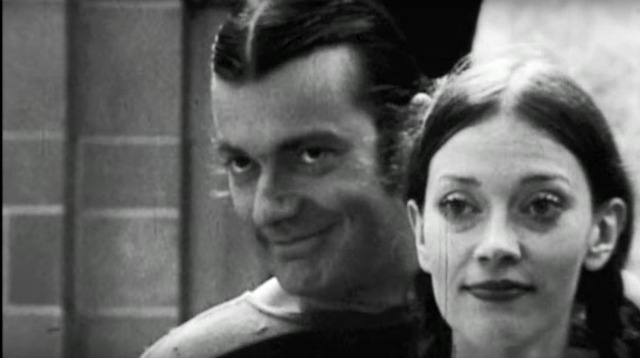Lost 1972 Film Starring Improv Legend Del Close Deserves A Wide Release
By Rob Christopher in Arts & Entertainment on Aug 23, 2016 6:55PM

Del Close and Judy Harris in A Multiple Choice Test
Though the name Del Close may not be familiar to those untutored in the history of improv, most are certainly familiar with the legendary actor and teacher's students. During his career he taught and mentored dozens of incredible comedians, including John Belushi, Gilda Radner, Bill Murray, Stephen Colbert, Amy Poehler and Tina Fey. In Chicago, he worked with both Second City and ImprovOlympic. He died in 1999, famously bequeathing his skull to the Goodman Theater so that he could fulfill his lifelong dream of playing Yorick in Hamlet. His lingering impact is profiled in a documentary that screened at this year's South by Southwest.
When he wasn't teaching or on stage, Close had a sideline as a character actor, appearing in small parts in films like Ferris Bueller's Day Off, American Graffiti and, most memorably, The Untouchables, as a corrupt alderman. But he never played a lead role onscreen—or so it was long assumed.
In July, I was invited to attend a private screening at Second City’s Ramis Screening Room of an unfinished film called A Multiple Choice Test, written and directed by Don Klugman. I'd been wowed by Klugman's earlier films, made during the 1960s, which I'd reviewed shortly after they were restored by the Chicago Film Archives. But I wasn't quite prepared for what I was about to see.
Shot in black-and-white 16mm film over the summer of 1972, A Multiple Choice Test is a free-floating black comedy that skewers (in no particular order) Richard J. Daley-era Chicago, the middle-class dating scene, the Vietnam War, casual drug use and experimental filmmaking. It's also an amazing time capsule of the period and local landscape, filmed at locations throughout Chicago, including the University of Chicago campus, the Germania Club and a forest preserve in Palatine. The most unnerving sequence, filmed in Cabrini-Green, centers on a cop-killing sniper who's positioned in one of the high-rises. Not just a historical curiosity, the film is as fresh and compelling as any contemporary film you're likely to see.
The standout cast was partially drawn from that era's Second City players, a crop of performers in place just a few years before Saturday Night Live debuted. Judy Harris, who was married to Klugman when the film was shot, channels a cross between Joan Baez and Louise Lasser (Mary Hartman, Mary Hartman) as a woman unhappily married to a pompous filmmaker. After a wild party fueled by copious amounts of pot and acid, she finds herself drifting into an affair with a man whose wife commits suicide. In scenes interspersed throughout the film, the man bemusedly recounts his life to a bored police typist. His failed marriage, his unfulfilling job at an ad agency and other existential concerns. Playing the role in a cool, deadpan style reminiscent of Bob Newhart is Del Close. His wry performance grounds the madcap film, leading us by the hand through the story's surreal twists and turns. In this clip, a fantasy interlude, Harris and Close imagine they're college kids again.
According to Klugman, Close volunteered to appear in the film, finding it a perfect match with his own sensibilities. "After reading the script, he felt it was so in sync with his personal ideas that he could imagine no one else playing the part," Klugman told Chicagoist. "He'd worked with Judy in several Second City shows, and they knew and appreciated each other as players." He added, "Del is remembered as a comedian and improviser. It's mind-bending to see how skilled he was at 'conventional acting.'"
A Multiple Choice Test remains the only feature film performance by Close in a lead role. But lack of funds and outside pressures eventually led Klugman to abandon the film during the editing stage. "Judy and I spit up, partly because of stress that occurred as we shot the film," he told Chicagoist. "Soon afterward, when Judy died, I stopped doing theatrical films. I stopped writing 'from the heart.' I built a career doing corporate, educational and documentary production."
Recently though he's begun revisiting the film. "Issues I cared about in the 1970s have not disappeared. Time has calmed my emotions," he explained. "Also the Chicago Film Archives has created a 'Don Klugman Collection' to preserve my stuff." The source materials for the film are expected to ultimately become part of that collection.
Today A Multiple Choice Test only exists as a scratchy workprint with a temporary soundtrack. However the original camera negatives and sound elements are pristine. "Finishing would mean a labor-intensive search through the footage. Difficult but not impossible," says Klugman. Of course digitizing picture and sound, and then performing a final edit, would take time as well as money. But it's been done successfully before.
And it's definitely worth doing in this case. Klugman's unfinished film is not only valuable because of the participation of Del Close but also because of the glimpse it offers of the indie film world of 1970s Chicago. It's also brave, funny and sharply written. Here's hoping that A Multiple Choice Test will soon be able to find the audience it deserves.